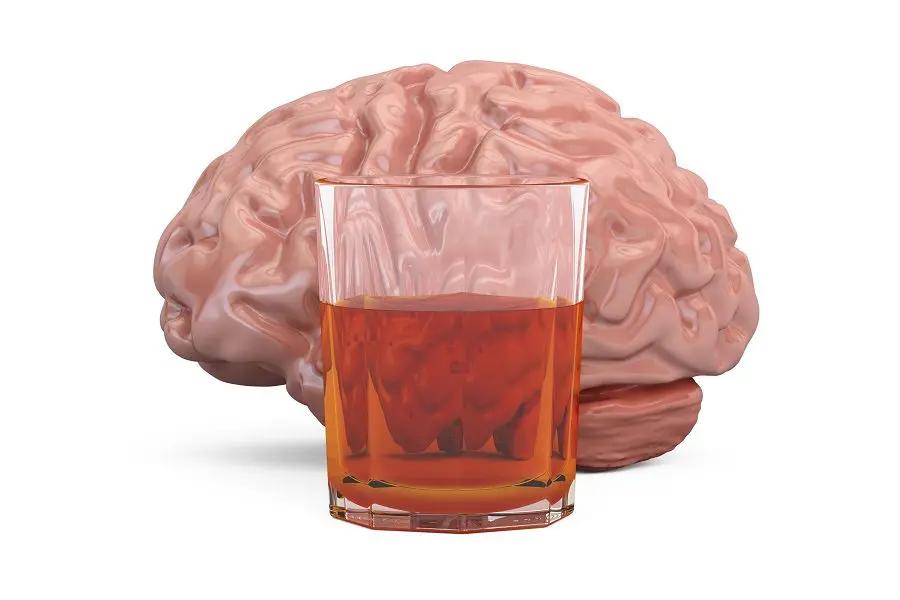Contents
It is widely believed that as a result of prolonged and immoderate alcohol consumption, the liver is exposed to the greatest danger. The negative consequences for this organ from excessive drinking are obvious, but this is only the visible part of the iceberg, since in reality there is not a single organ in the human body that would not suffer from alcohol abuse. And the most destructive is the effect of alcohol on the brain and nervous system, on which ethanol delivers precise and strong blows.
Experts illustrate this statement as follows: the concentration of alcohol in the blood is proposed to be taken as a unit. In this case, in the liver, this indicator will be equal to 1,45, and in the brain – already 1,75.
How alcohol affects the brain
The human brain contains about 100 billion neurons, representing the most complex information network comparable in scale to the World Wide Web. Neurotransmitters are necessary for adequate transmission of impulses between neurons. Usually they are synthesized by the body itself. Alcohol is able to imitate the work of these substances, “pretending” to be dopamine or gamma-aminobutyric acid. In this case, it serves as a kind of “master key” for the brain and starts a chain of fatal physiological events.
With a high concentration of ethanol in the brain, the production of its own neurotransmitters is sharply reduced, and the number of receptors sensitive to them is reduced. The connections between neurons are changing, instead of the usual ways of transmitting nerve impulses, alternative paths are “trampled”.
More and more of the substance that causes a dopamine response is required, and if it is not supplied, the person loses the stimulus and ceases to experience positive emotions. This is what the processes going on inside look like. And the external signs at various stages of intoxication are well known to everyone:
- initial euphoria, feverish excitement, desire for irrepressible fun;
- subsequent retardation;
- absent-mindedness, inability to concentrate on the topic of conversation;
- incoordination, staggering gait, slurred speech;
- inadequate auditory and visual sensations;
- increased aggressiveness and resentment;
- alcohol amnesia.
A person who has abused strong drinks loses the ability to critically evaluate his actions and what is happening around him. It is at these moments that decisions are made that, in a sober state, would not have come to mind. The comedy “The Hangover” is full of such examples, and in the same “Irony of Fate” alcohol played a not the best joke with the characters.
And all these are momentary consequences, but prolonged and uncontrolled drinking of alcoholic beverages has a cumulative effect. Against the background of constantly occurring oxygen starvation and insufficiency of cerebral circulation, neurons die, and encephalopathy may subsequently develop. The functionality of the brain in drinking people is steadily declining: memory worsens, rationality and logic suffer, the ability to recognize patterns and creativity disappears.

Equally detrimental is the effect of alcohol on the nervous system. A person with a solid experience of drinking alcohol at times increases the likelihood of mental disorders. Sleep disturbances, emotional instability, depressive states, the risk of alcoholic psychosis and hallucinations, as well as classic delirium – the consequences are progressive. The final stage is often the complete degradation of the individual, the collapse of all social and family ties.
Brain cells: not recoverable?
Decades of scientific debate have been devoted to this issue, the results of which have found expression in the proverb that has come into use that nerve cells do not recover. However, science does not stand still: now one, then another well-known laboratory makes loud statements that the brain is capable of forming new neurons. This opinion has not yet become an axiom, and the mechanism for detecting new cells in the hippocampus has not yet been fully developed.
In any case, in order for the brain cells to “come to their senses” after alcohol, doctors recommend returning to a sober and active lifestyle, resorting to drug therapy.
The Truth in Wine: Is There Any Benefit from Drinking?
The question of the possible benefits of alcohol is one of the most controversial, causing fierce debate among doctors and direct consumers. One of the popular arguments of supporters of moderate drinking is the high life expectancy in European countries with a developed culture of drinking wine or beer. In Spain, this figure is 82,2 years, in France – 81, Germany – 8, Czech Republic – 80,5. But the average alcohol consumption per capita in these countries is close to the Russian one.
Research scientists have shown that alcohol reduces the incidence of atherosclerosis and, accordingly, the risk of death from a heart attack. But researchers agree that not all alcoholic beverages have a positive effect on the cardiovascular system, but only dry red wine. The reason for this effect is called a decrease in the synthesis of fibrinogen, which is involved in the process of thrombosis. On the example of participants in a voluntary experiment, it was proved that daily intake of small doses of wine for 4 weeks helps to reduce the content of this substance in the blood by 0,3 g / l.
However, most modern scientific works are focused on a positive effect on the heart and blood vessels, and the effect of alcohol on the brain and other organs often remains outside the scope of consideration.
For those who would like to level and mitigate the negative effects of alcohol on the brain and central nervous system, experts studying addiction problems recommend completely getting rid of addiction. At the same time, WHO, aware of how difficult it is to translate these good wishes into reality, has developed recommendations regarding safe doses of alcohol: this is 10 liters of pure alcohol per year. Whether to adhere to conditionally permissible “drinks” or stop experimenting on one’s own body – everyone is free to choose for himself.









